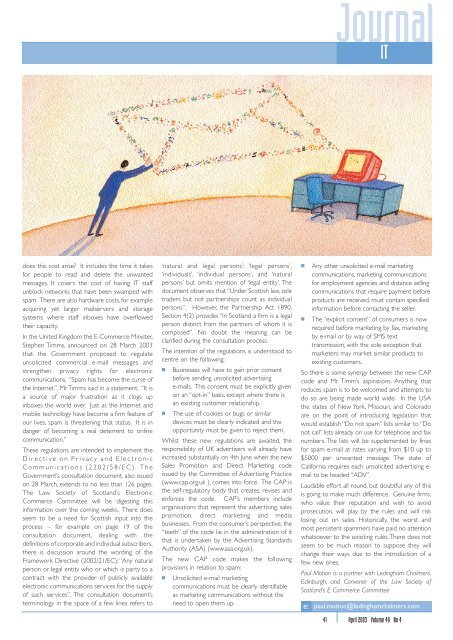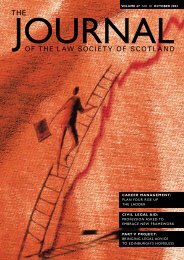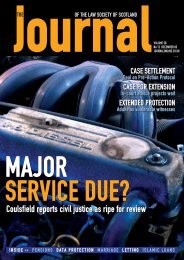Law Society of Scotland - The Journal Online
Law Society of Scotland - The Journal Online
Law Society of Scotland - The Journal Online
You also want an ePaper? Increase the reach of your titles
YUMPU automatically turns print PDFs into web optimized ePapers that Google loves.
does this cost arise? It includes the time it takes<br />
for people to read and delete the unwanted<br />
messages. It covers the cost <strong>of</strong> having IT staff<br />
unblock networks that have been swamped with<br />
spam. <strong>The</strong>re are also hardware costs, for example<br />
acquiring yet larger mailservers and storage<br />
systems where staff inboxes have overflowed<br />
their capacity.<br />
In the United Kingdom the E-Commerce Minister,<br />
Stephen Timms, announced on 28 March 2003<br />
that the Government proposed to regulate<br />
unsolicited commercial e-mail messages and<br />
strengthen privacy rights for electronic<br />
communications. “Spam has become the curse <strong>of</strong><br />
the Internet.”, Mr Timms said in a statement. “It is<br />
a source <strong>of</strong> major frustration as it clogs up<br />
inboxes the world over. Just as the Internet and<br />
mobile technology have become a firm feature <strong>of</strong><br />
our lives, spam is threatening that status. It is in<br />
danger <strong>of</strong> becoming a real deterrent to online<br />
communication.”<br />
<strong>The</strong>se regulations are intended to implement the<br />
Directive on Privacy and Electronic<br />
Communications (2202/58/EC). <strong>The</strong><br />
Government’s consultation document, also issued<br />
on 28 March, extends to no less than 126 pages.<br />
<strong>The</strong> <strong>Law</strong> <strong>Society</strong> <strong>of</strong> <strong>Scotland</strong>’s Electronic<br />
Commerce Committee will be digesting this<br />
information over the coming weeks. <strong>The</strong>re does<br />
seem to be a need for Scottish input into the<br />
process – for example on page 19 <strong>of</strong> the<br />
consultation document, dealing with the<br />
definitions <strong>of</strong> corporate and individual subscribers,<br />
there is discussion around the wording <strong>of</strong> the<br />
Framework Directive (2002/21/EC): “Any natural<br />
person or legal entity who or which is party to a<br />
contract with the provider <strong>of</strong> publicly available<br />
electronic communications services for the supply<br />
<strong>of</strong> such services”. <strong>The</strong> consultation document’s<br />
terminology in the space <strong>of</strong> a few lines refers to<br />
‘natural and legal persons’; ‘legal persons’,<br />
‘individuals’, ‘individual persons’, and ‘natural<br />
persons’ but omits mention <strong>of</strong> ‘legal entity’. <strong>The</strong><br />
document observes that “Under Scottish law, sole<br />
traders but not partnerships count as individual<br />
persons”. However, the Partnership Act 1890,<br />
Section 4(2) provides “In <strong>Scotland</strong> a firm is a legal<br />
person distinct from the partners <strong>of</strong> whom it is<br />
composed”. No doubt the meaning can be<br />
clarified during the consultation process.<br />
<strong>The</strong> intention <strong>of</strong> the regulations is understood to<br />
centre on the following:<br />
■ Businesses will have to gain prior consent<br />
before sending unsolicited advertising<br />
e-mails. This consent must be explicitly given<br />
on an “opt-in” basis, except where there is<br />
an existing customer relationship.<br />
■ <strong>The</strong> use <strong>of</strong> cookies or bugs or similar<br />
devices must be clearly indicated and the<br />
opportunity must be given to reject them.<br />
Whilst these new regulations are awaited, the<br />
responsibility <strong>of</strong> UK advertisers will already have<br />
increased substantially on 4th June when the new<br />
Sales Promotion and Direct Marketing code<br />
issued by the Committee <strong>of</strong> Advertising Practice<br />
(www.cap.org.uk ), comes into force. <strong>The</strong> CAP is<br />
the self-regulatory body that creates, revises and<br />
enforces the code. CAP’s members include<br />
organisations that represent the advertising, sales<br />
promotion, direct marketing and media<br />
businesses. From the consumer’s perspective, the<br />
“teeth” <strong>of</strong> the code lie in the administration <strong>of</strong> it<br />
that is undertaken by the Advertising Standards<br />
Authority (ASA) (www.asa.org.uk).<br />
<strong>The</strong> new CAP code makes the following<br />
provisions in relation to spam:<br />
■ Unsolicited e-mail marketing<br />
communications must be clearly identifiable<br />
as marketing communications without the<br />
need to open them up.<br />
<strong>Journal</strong><br />
IT<br />
■ Any other unsolicited e-mail marketing<br />
communications, marketing communications<br />
for employment agencies and distance selling<br />
communications that require payment before<br />
products are received, must contain specified<br />
information before contacting the seller.<br />
■ <strong>The</strong> “explicit consent“ <strong>of</strong> consumers is now<br />
required before marketing by fax, marketing<br />
by e-mail or by way <strong>of</strong> SMS text<br />
transmission, with the sole exception that<br />
marketers may market similar products to<br />
existing customers.<br />
So there is some synergy between the new CAP<br />
code and Mr Timm’s aspirations. Anything that<br />
reduces spam is to be welcomed and attempts to<br />
do so are being made world wide. In the USA<br />
the states <strong>of</strong> New York, Missouri, and Colorado<br />
are on the point <strong>of</strong> introducing legislation that<br />
would establish “Do not spam” lists similar to “Do<br />
not call” lists already on use for telephone and fax<br />
numbers. <strong>The</strong> lists will be supplemented by fines<br />
for spam e-mail at rates varying from $10 up to<br />
$5000 per unwanted message. <strong>The</strong> state <strong>of</strong><br />
California requires each unsolicited advertising email<br />
to be headed “ADV”.<br />
Laudable effort all round, but doubtful any <strong>of</strong> this<br />
is going to make much difference. Genuine firms,<br />
who value their reputation and wish to avoid<br />
prosecution, will play by the rules and will risk<br />
losing out on sales. Historically, the worst and<br />
most persistent spammers have paid no attention<br />
whatsoever to the exisiting rules.<strong>The</strong>re does not<br />
seem to be much reason to suppose they will<br />
change their ways due to the introduction <strong>of</strong> a<br />
few new ones.<br />
Paul Motion is a partner with Ledingham Chalmers,<br />
Edinburgh, and Convener <strong>of</strong> the <strong>Law</strong> <strong>Society</strong> <strong>of</strong><br />
<strong>Scotland</strong>’s E Commerce Committee<br />
e:<br />
paul.motion@ledinghamchalmers.com<br />
41 April 2003 Volume 48 No 4










